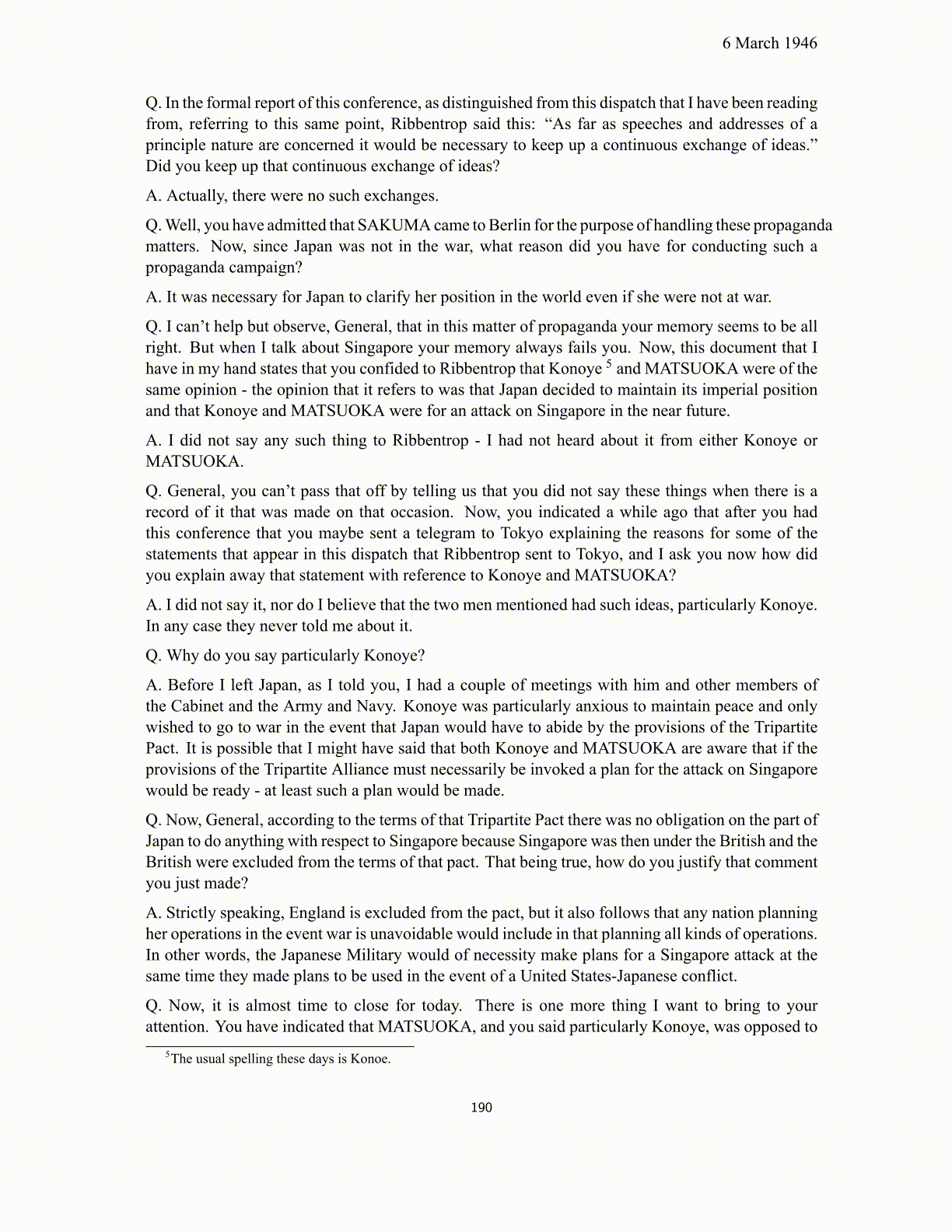
6 March 1946 Q. In the formal report of this conference, as distinguished from this dispatch that I have been reading from, referring to this same point, Ribbentrop said this: “As far as speeches and addresses of a principle nature are concerned it would be necessary to keep up a continuous exchange of ideas.” Did you keep up that continuous exchange of ideas? A. Actually, there were no such exchanges. Q. Well, you have admitted that SAKUMA came to Berlin for the purpose of handling these propaganda matters. Now, since Japan was not in the war, what reason did you have for conducting such a propaganda campaign? A. It was necessary for Japan to clarify her position in the world even if she were not at war. Q. I can’t help but observe, General, that in this matter of propaganda your memory seems to be all right. But when I talk about Singapore your memory always fails you. Now, this document that I have in my hand states that you confided to Ribbentrop that Konoye 5 and MATSUOKA were of the same opinion - the opinion that it refers to was that Japan decided to maintain its imperial position and that Konoye and MATSUOKA were for an attack on Singapore in the near future. A. I did not say any such thing to Ribbentrop - I had not heard about it from either Konoye or MATSUOKA. Q. General, you can’t pass that off by telling us that you did not say these things when there is a record of it that was made on that occasion. Now, you indicated a while ago that after you had this conference that you maybe sent a telegram to Tokyo explaining the reasons for some of the statements that appear in this dispatch that Ribbentrop sent to Tokyo, and I ask you now how did you explain away that statement with reference to Konoye and MATSUOKA? A. I did not say it, nor do I believe that the two men mentioned had such ideas, particularly Konoye. In any case they never told me about it. Q. Why do you say particularly Konoye? A. Before I left Japan, as I told you, I had a couple of meetings with him and other members of the Cabinet and the Army and Navy. Konoye was particularly anxious to maintain peace and only wished to go to war in the event that Japan would have to abide by the provisions of the Tripartite Pact. It is possible that I might have said that both Konoye and MATSUOKA are aware that if the provisions of the Tripartite Alliance must necessarily be invoked a plan for the attack on Singapore would be ready - at least such a plan would be made. Q. Now, General, according to the terms of that Tripartite Pact there was no obligation on the part of Japan to do anything with respect to Singapore because Singapore was then under the British and the British were excluded from the terms of that pact. That being true, how do you justify that comment you just made? A. Strictly speaking, England is excluded from the pact, but it also follows that any nation planning her operations in the event war is unavoidable would include in that planning all kinds of operations. In other words, the Japanese Military would of necessity make plans for a Singapore attack at the same time they made plans to be used in the event of a United States-Japanese conflict. Q. Now, it is almost time to close for today. There is one more thing I want to bring to your attention. You have indicated that MATSUOKA, and you said particularly Konoye, was opposed to 5 The usual spelling these days is Konoe. 190